
Twenty-Five, Twenty One’; A Bumpy Trip Down Memory Lane…
Anyone who is aware or familiar with the modern-classic, the ‘Reply’ series, will appreciate that the concept of nostalgia, mysterious flashbacks and trying to piece together events between the past and future ( especially with regards to romantic relationships) are not ground-breaking writing setups.
Nevertheless while ‘ Twenty Five, Twenty One’ does not play around with a new or an original idea, the narrative did offer viewers with a heartfelt coming-of-age story. In addition to this, ‘ Twenty-Five, Twenty-One’ presented an unravelling mystery. Although the drama could often be captivating, it is important to acknowledge that ‘Twenty-Five, Twenty One’ still suffered at times from inconsistent pacing and execution.
The main narrative and timeline of ‘Twenty Five, Twenty One’ is predominantly set in the late 1990s and focuses upon its two main leads; aspiring athletic fencer, 18 year-old Na Hee Do ( Kim Tae Ri- ‘ Mr .Sunshine’, ‘ The Handmaiden’ and ‘Space Sweepers’ ) and her hardworking ‘’sunbae’’ and potential love interest, college-student Baek Yi Jin ( Nam Joo Hyuk- ‘Who Are You: School 2015’, ‘ Weightlifting Fairy Kim Bok-Joo’ and ‘ The Light in Your Eyes’).
The second timeline of the series is set in the near-present day. Instead of focusing solely on an adult Hee Do, the subplot instead focuses on Hee Do’s young daughter Kim Min Chae ( Choi Myung Bin- ‘ The King’s Affection’, ‘ Dramaworld2’). Within these future events of the main narrative, adult Hee-Do ( played by Kim So Hyun- ‘The King and I’) is revealed to have been shaped greatly by the unfolding events of her past. She is no longer an optimistic dreamer, and instead has turned into a prudent helicopter parent; attempting to mould Min Chae into becoming a prodigal ballerina through a regimented routine and regime, but without always acknowledging her daughter’s personal feelings and dreams.
Annoyed and fed up by her mother’s micromanaging, Min Chae is shocked when she stumbles upon her mother’s old diaries, photos and journals. Intrigued, she begins to digress through her mother’s personal coming-of-age accounts during the aftermath of the 1997 IMF crisis. Min Chae is astounded to follow her mother’s journey and slowly begins to understand more about her mother’s past and circumstances, especially with regards to her complicated feelings for Baek Yi-Jin.
Screenwriter Kwon Do Eun is most likely known by viewers for her critically-successful screenplay ‘Search: WWW’. Similar to her previous work, Kwon Do Eun added a similar stylistic approach of heart-warming angst and multi-layered characters throughout the screenplay for ‘Twenty-Five, Twenty-One’.
However despite several tonal similarities between Do Eun’s screenplays, it is important to note that ‘Twenty-Five, Twenty-One’ takes a different approach with its storytelling, particularly by using a non-linear narrative. Non-linear narratives can allow for some brilliant opportunities in order for screenwriters to explore character-depth, intensify climatic build-ups through flashbacks and flashforwards, as well as helping to entice the audience.
This was particularly apparent in ‘Twenty-Five, Twenty-One’ via the main storyline by focusing upon the potential romantic relationship between Hee Do and Yi Jin, as well as the complicated mother-daughter bond between Hee Do and Min Chae during certain scenes in the subplot surrounding events in the present-day.
With regards to the latter mentioned plot point, the potential onscreen chemistry between Hee Do and Yi-Jin was quintessential towards impacting events in the narrative. Admittedly and refreshingly rather than allowing the storyline to be entirely focused upon the romantic elements of Hee Do and Yi-Jin’s relationship, the series offered opportunities also for viewers to divulge deeper into the aspirations and sentience of the characters at times.
In particular, this was shown through the difficult journey taken at times by the female lead and male lead through different complicated situations and interactions. For the female lead, this was apparent throughher prickly relationship with her mother and news anchor Shin Jae Kyung ( Seo Jae Hee- ‘Run On’, ‘ Artificial City; and ‘The Youngest Son Of A Conglomerate’) as well as her rivalry with with Go Yoo-rim ( Bona ‘ Hit The Top’, ‘ Girls’ Generation 1979’ and ‘ Your House Helper’).
For male lead Yi-Jin, his personal conflicts came early on in the series. After his father’s affluent business went bankrupt nearly overnight during the economic crisis, Yi-Jin was forced to take on several part-time jobs in order to make ends meet. However, Yi-Jin feels as though he has struck gold after landing a position at a broadcasting company. Yet similar to the female lead’s personal struggles in order to attain her dreams, Yi-Jin soon acknowledges that his journey into the television industry isn’t as straightforward as it seems.
Nevertheless although the narrative helped to offer moments for characters to feel dynamic, it is hard to ignore that Hee Do and Yi-Jin were still shoehorned at times into specific roles and scenarios in order to drag-out misunderstandings and angst. In particular this was often prominent through Yi-Jin’s age difference and dating experience in comparison to Hee Do, who was sometimes subjugated during some of these moments as a victim of her own inexperience.
This wasn’t entirely a bad writing decision per say. Although age difference relationships can often be the subject of debate in narratives, when approached tactfully, they can allow for some intriguing explorations into setups, character archetypes and sociological barriers between love interests. Nevertheless although some praise should be given to Do Eun’s overtness with the setup and subject matter tackled, it is still notable that, Yi-Jin and Hee Do’s dilemmas could often feel somewhat cliché and enforced. Perhaps this was also due to the fact that of these misunderstandings and climatic scenarios ( particularly incidents where Hee Do would jump to conclusions or misconceptions about Yi-Jin) did become more repetitive as episodes progressed.
Kim Tae Ri and Nam Joo Hyuk starred as main leads and potential lovers. Kim Tae Ri added a likeable charm to her onscreen persona, Hee Do. It is a difficult feat at times for an actor playing the role of a younger character to adopt specific mannerisms or characteristics in order to make their performance feel authentic. Nevertheless although there were some moments of overblown dialogue, Kim Tae Ri brilliantly helped to bring young Hee Do to life through her bubbly character and personality. In addition to Tae Ri, A-lister actor Nam Joo Hyuk co-starred alongside the actress as main male lead Baek Yi-Jin. Although there were moments initially where Joo Hyuk’s performance could feel somewhat stilted by his limited screen time and interactions with the female lead, Joo Hyuk was gradually allowed more opportunities in order to add an emotive edge to his onscreen character.
It is important to point out that the main leads’ onscreen chemistry was decent enough. Kim Tae Ri and Nam Joo Hyuk’s initial chemistry felt somewhat stagnant in parts, but certainly did improve as episodes progressed.
In addition to the romantic relationship explored between the main leads in the series, there is also another important bond covered in the subplot; the relationship between Hee Do and her daughter. Kim So Hyun takes on the role as the adult-version of Hee Do. It seemed surprising considering the respectful age of Kim Tae Ri, that another actress was cast to play an older version of her character. Nevertheless, So Hyun helped to embody a certain believability with her onscreen performance. Alongside actress Kim So Hyun, co-star and child actress Choi Myung Bin delivered a brilliant performance as Hee Do’s daughter Kim Min Chae.
The maternal bond explored in ‘Twenty-Five, Twenty One’ between the main female lead’s adult-self and her daughter is arguably one of the most intriguing as well as shoehorned subplots in the drama’s narrative. Of course, screenwriter Kwon Do Eun added a certain level of depth to the onscreen relationship. Hee Do’s reasons for becoming a “controlling figure” within her daughter’s life are more complex than merely out of spite or jealousy. ( Her relationship with her own mother playing a big part with wanting to give opportunities to Min Chae.) Similarly while it would be easy to portray Min Chae as the “ fractious” daughter, Min Chae’s frustration seemed to reflect a lot of convoluted feelings.
Nevertheless despite Do Eun’s presentation of the relationship, it is hard to ignore that while this was still only a subplot, the storyline revolving around Min Chae and Hee Do was often shoehorned into a limited time frame, with inconsistent time-skips and flittering in between rarely helping to smooth out this counterplot by the ending of the series.
Sadly this was a slight problem with ‘ Twenty Five, Twenty One’. Although the narrative was heavily focused upon the events of the main leads and their complex potential onscreen chemistry, subplots and side characters could often be left out of the equation. This was mainly due to the fact that in a time space of sixteen episodes, the narrative had to be compact and focusing upon the main narrative rather than homing in on side plots did become necessary as episodes progressed.
On the other hand this is admittedly where ‘ Twenty Five, Twenty One’ could sometimes hit a slight rut; the side characters and subplots were often somewhat inconsistent and rushed. Even in a non-linear narrative, the series would often leave certain side characters’ intriguing backstories and character-arcs on the sideline, briefly explored in order to fill in screen time though rarely given a concise conclusion by the series finale. ( This was apparent for side characters such as Go Yoo-rim, Hee Do’s rival, played by idol-actress Bona [ Hit The Top’, ‘ Girls’ Generation 1979’ and ‘ Your House Helper’], Choi Hyun-Wook’s [ Real:Time:Love ’, ‘ Racket Boys] role as Hee Do’s popular classmate Moon Ji-woong, Lee-Joo Myung’s [ My Fellow Citizens!’, ‘Missing: The Other Side’ and ‘ Kairos’ ] role as Ji-woong’s childhood friend, Ji Seung-wan and of course Hee Do’s daughter played by Choi Myung Bin, Min Chae.)
Nevertheless it is hard to ignore that while there were some evident inconsistencies with pacing, ‘ Twenty Five, Twenty One’ was able to encapsulate a certain nostalgic and retro tone through the visionary eye of director Jung Ji Hyun ( ‘ You Are My Spring’, ‘ Search: WWW’). The opening of the series brings forth a stylistic approach of fuzzy gradients and vivid title sequences, akin to the opening credits of a TV show from a VHS tape.
There is also a subtle difference placed between the present day scenes and the past ; drab and mundane shots are suddenly animated to life in flashbacks through an explosion of vivid palettes and warm tones, helping to capture the buzzing warmth and joie de vivre of Hee Do’s youth. ( One of the most memorable and striking parallel scenes drawn between the past and present day being through the bubblegum blue diner that Min Chae is shown to visit with her mother in the present day. The bright blues are strikingly odd against the mundane attire of the characters. In the same episode, a parallel scene is shown through Yi-Jin’s visit to a similar diner; instead strikingly bright and warm through the bubbly and rose-tinted perspective of the past.)
As for the comprised soundtrack of the series, ‘ Twenty Five, Twenty One’ is admittedly less ambitious than it should’ve been. For a series set against the backdrop of the late 90s where music (especially in South-Korea ) was being explored and pushed beyond conventional tastes, it felt odd that ‘ Twenty Five, Twenty One’ was somewhat limited to an array of somewhat generic upbeat love ballads and schmaltzy pop singles. Nevertheless it is important to acknowledge that there are some catchy songs within the OST , in particular TAEIL’s “Starlight (스타라이트)" remaining one of the most memorable tracks throughout the series .
Overall ‘ Twenty Five, Twenty One’ is a coming of age tale which offered a nostalgic and poignant reflection for viewers upon youth and childhood. The issues of chasing dreams, the difficulties of being at the passing boundaries between childhood and adulthood as well as struggling with friendships and young love, were central and universal messages within the drama’s narrative. However despite the bubbling sweetness of ‘ Twenty Five, Twenty One’, the series wasn’t without its more apparent faults of inconsistent pacing either. Nevertheless viewers will likely be captivated by the narrative’s refreshing and lighthearted nostalgia ride, niche in parts, but surprisingly offering several shocking twists and turns by the finale. Overall a very good watch.
Was this review helpful to you?

‘ F4 Thailand: Boys Over Flowers’; The Adaptation That Could’ve Been So Much More…
When ‘ Meteor Garden’ first introduced a mainstream audience to the world of Kamio Yoko’s shoujo Cinderella story back in 2001, very few individuals would’ve been able to have predicted the ongoing legacy and impact of Yoko’s work. Indeed nearly two decades and multiple adaptations later, a new generation has been introduced to the world of ‘ Hana Yori Dango’ through the Thai adaptation of the mangaka’s work ‘ F4 Thailand: Boys Over Flowers’. The sixteen-episode series has gained popular attention by fans and critics alike. However despite its praise, it is important to acknowledge that the series hasn’t escaped the realm of scrutiny and criticism either.Similar to its predecessor adaptations , ‘ F4 Thailand: Boys Over Flowers’ introduces viewers to its main female leader and heroine "Gorya" Thitara Jundee ( Tontawan Tantivejaku). An ordinary girl coming from a humble background, Gorya has entered Kocher High School, a prestigious school for the heirs of Thailand’s wealthiest families, through a varsity scholarship.
Gorya’s parents are over the moon with her attendance at the illustrious institution. Despite not being able to afford new shoes for their daughter, they are determined to ensure Gorya will finish high school with a praiseworthy diploma from Kocher. Yet despite rubbing shoulders with some of Thailand’s wealthiest heirs, Gorya has become weary of drawing attention to herself, especially with regards to her family status.
Aside from befriending classmate Hana (Wanwimol Jaenasavamethee), Gorya is determined to keep her head down until graduation. Indeed instead of partying or enjoying a hedonistic lifestyle like some of her classmates , Gorya spends her time predominantly divided between her studies, home and her part-time job at florist shop ‘Maytee O Garden’ ( a word pun homage to ‘ Meteor Garden’) where she works alongside best friend Kaning ( Yongwaree Anilbol).
However, Gorya’s hopes for a quiet life at school are soon dashed when she ends up on the wrong side of notorious F4 leader "Thyme" Akira Paramaanantra ( Vachirawit Chivaaree). With fellow F4 members “ Ren” Renrawin Aira ( Jirawat Sutivanichsak), "Kavin" Taemiyaklin Kittiyangkul ( Metawin Opas-iamkajorn) and "M.J." Methas Jarustiwa ( Hirunkit Changkham), Thyme’s tyrannical reign of bullying and authority over the school are suddenly challenged by Gorya’s defiance to become a scapegoat.
Despite Thyme’s bombardment of bullying tactics to make her back down, Gorya finds the determination to carry on through her growing unrequited feelings for F4 member Ren. Suave, mysterious and yearning over his childhood friend Mira ( Yongwaree Anilbol), Gorya finds her heart torn between her crush and her convoluted feelings for Thyme.
Of course it is important to to acknowledge that while ‘ F4 Thailand: Boys Over Flowers’ is an adaptation from mangaka Kamio Yoko’s bestselling work, ‘ F4 Thailand: Boys Over Flowers’ is respectfully ( like nearly all of the adaptations) a standalone production in its own right. Therefore, this has allowed certain opportunities and limitations by screenwriters Waneepan Ounphoklang, Jarinee Thanomyat and Suwanun Pohgudsai in order to encapsulate their respectfully young target audience.
One of the most efficient ways of keeping the audience intrigued came through the evident prevalence of technology in the series. From smart phones to social media, ‘ F4 Thailand: Boys Over Flowers’ placed heavy emphasis upon the sphere of modern youth culture. ( Especially through issues such as online harassment and cyber bullying in the early first part of the narrative.)
Nevertheless despite the grandeur shown through the everyday lifestyle of Thyme and the F4 , it is hard to ignore that issues such as abuse and bullying being glossed over by the series have been the subject of mixed-reception also. ( Especially with regards to the divisive relationship shown onscreen between Thyme and Gorya, arguably more lighthearted in comparison to other adaptations though not without its more controversial moments either.)
Tontawan Tantivejaku took on the role as main female lead and heroine "Gorya" Thitara Jundee. Actively involved in the world of modelling, it may surprise some that ‘ F4 Thailand: Boys Over Flowers’ marked the model’s acting debut . Nevertheless despite Tontawan Tantivejaku offering a fresh face to the role of the “tough and defiant” female lead, it became apparent that Tontawan’s inexperience at times often led to several awkward line deliverances over the duration of the series.
Of course this isn’t to entirely blame Tontawan Tantivejaku for her acting. Considering that it was respectfully the model’s first acting role, Tontawan carried herself surprisingly well throughout most of the drama , adding a surprisingly sweet and dynamic edge to her onscreen persona.
As an onscreen character, Gorya is admittedly a mixed-bag of writing strengths and flaws for the female heroine. Where other adaptations have struggled to encapsulate the female lead’s wider interactions with her family as well as their economic struggles, ‘ F4 Thailand: Boys Over Flowers’ added a surprisingly sentimental touch by focusing upon simple and daily interactions with Gorya’s family during most of the series.
However for a female lead who could be surprisingly resilient and laidback in comparison to some of her predecessors, Gorya could often feel as though she had hit a writing rut by the halfway point of the drama. This was mainly due to the fact that despite her initial growth by warming up to the F4 and attempting to navigate her own ambivalent feelings for Ren and Thyme, the second-half of ‘ F4 Thailand: Boys Over Flowers’ attempted to enforce Gorya into the leading role of the “ fickle heroine”; showing open affection, before seemingly changing her opinions out of an inconvenient dilemma and then dragging out major misunderstandings between herself and Thyme.
Although this cannot be entirely faulted as a bad writing decision per say by helping to intensify the tension of the series, ‘ F4 Thailand: Boys Over Flowers’ could sometimes inhibit further opportunities to see Gorya fully explore her mixed feelings in depth, or at least being given opportunities to grow or be explored beyond her specified role. ( This often resulted within Gorya’s later role in the series feeling somewhat stunted and enforced; rarely allowing her actions such as bending to the will of Thyme’s mother, feeling well-matched against her disposition and character.) Nevertheless despite a rocky first performance for the young model, there is certainly potential to see Tontawan Tantivejaku taking on future projects.
Then of course costarring alongside Tontawan Tantivejaku was Vachirawit Chivaaree ( alternatively known as ‘ Bright’) playing main male lead of the series, “Thyme” Akira Paramaanantra. For those familiar with Bright’s acting career, specifically for his role in the ‘2gether; The Series’, then most will probably agree that the actor certainly seemed an unusual choice. Nevertheless, Bright could be surprisingly tactful at times within his performance as Thyme; adding a nuanced touch of uncertainty and mixed-emotions through intonations and even micro-expressions onscreen.
However despite a superfluous amount of effort put into the role by the actor, it is hard to ignore that Bright’s approach to his onscreen character could feel somewhat overacted . This is not entirely the actor’s fault per say. Thyme’s written dialogue could often overblown at times and in addition to an onset of niche setups, Bright’s performance as Thyme was often somewhat inconsistent as a result.
This of course brings us onto one of the biggest elephants of the room within ‘ F4 Thailand: Boys Over Flowers’, main male lead Thyme. There are certainly some positive attributes to comment about Thyme. In comparison to some of his previous incarnations who were defined purely by their haughty exterior and sardonicism, Thyme could often be said to be a “ kinder” version of his predecessors. Indeed, Thyme was often defined by his petulance and fractiousness around the female lead ( such as his demands and desires) , but he certainly often wore his heart upon his sleeve also.
However although it could be said that Thyme offered a more open and empathic version of the main lead in comparison to other incarnations, there is still a divisive issue for critics and fans alike surrounding the relationship between Thyme and Gorya throughout the duration of the series.
Writers Waneepan Ounphoklang, Jarinee Thanomyat and Suwanun Pohgudsai arguably did present the notion that Thyme was hopelessly infatuated by Gorya. However it is hard to excuse that despite his seeming bursting affections for the female lead, his treatment towards Gorya’s could sometimes be unnerving.
To explain this further it is important to point out that Thyme isn’t the first incarnation to come under rapid fire for his treatment of the female lead. Surprisingly this is not to say that these actions and problems should not have existed in the series. (In fact it could be argued that they could’ve allowed an open platform to address these issues, especially with consideration to the target audience.)
On the other hand it is hard to ignore that Thyme’s frenetic actions were often a sticky subject in the series. Respectfully while Thyme was held accountable for some of his actions, it will still provoke debate and discussion surrounding the initial aftermath of his actions also. ( In particular having resorted to often “ blowing up” around Gorya; resorting to yelling, throwing things or becoming openly aggressive with his body language during arguments rarely being addressed with more script .)
Then of course there’s another big issue to discuss with regards to ‘ F4 Thailand: Boys Over Flowers’; Thyme’s “complicated” relationship with his mother and major antagonist of the series, Roselyn Paramaanantra ( Cindy Bishop). In comparison to certain adaptations which rarely ventured into the realm of Thyme’s bond with his mother being on a knife’s edge, the narrative often did present some early indications towards Thyme’s relationship with his mother being a difficult subject.
However instead of offering potential room for growth, Thyme’s estranged relationship with Roselyn was often widely disregarded until it was necessary for specific plot points. This was mainly due to the fact that
Thyme’s mother was often shoehorned ( like many adaptations) into the specific role of the antagonist; expediting the plot and dilemmas as well as giving the necessary introduction for Gorya and viewers to his older sister Tia ( Maria Poonlertlarp) but rarely being explored further. ( This was particularly shown in the latter-half of the series, leading to a dissatisfying conclusion for many.)
Then of course there’s Jirawat Sutivanichsak ( know alternatively by his nickname ‘ Dew’) as second male lead Ren. Similar to his costar and fellow model Tontawan Tantivejaku, ‘ F4 Thailand: Boys Over Flowers’ marked Dew’s first acting debut. Dew’s performance was decent enough by channelling into the mystique charm of his character. However whilst the rookie actor certainly made a decent acting debut, his performance in ‘ F4 Thailand: Boys Over Flowers’ could admittedly feel a little lacklustre with certain line deliverances.
Admittedly Ren served as a good example of writing an intriguing love rival for the main lead and a potential love interest for the main heroine. While he did not arguably quite possess the same joie de vivre as some of his counterparts, it was hard to ignore the fact that Ren possessed an element of enticing mystique and suave charm as an onscreen character . Nevertheless similar to some of the writing issues of the series, Ren’s character arc and development could feel somewhat flat lined by shoehorned plot events. ( In particular his character-arc and ambivalent feelings for his sister-figure Mira suffering from an anticlimactic conclusion.)
Tontawan Tantivejaku’s chemistry with costars Bright and Dew is admittedly variable from scene to scene. Nevertheless there is a certain charm especially from Tantivejaku’s onscreen and potential chemistry with Bright ( despite some arguably more divisive issues surrounding their onscreen characters), that helped to bring scenes to life and keep viewers enticed.
In addition to our main leads it is important to acknowledge the subplot revolving around supporting characters, M.J. and Kavin . Kavin’s potential wavering onscreen relationship with Kaning was placed on the sidelines of the narrative as a filler-in subplot to the main narrative ( though somewhat rushed by later plot events) , while M.J.’s “side story” was forced into a brief sponsorship sketch with KFC at the end of episodes. ( Often resulting in a conspicuous placement of a KFC food or drink product onscreen.)
However this is naturally where a major rut did hit the writing team for ‘ F4 Thailand: Boys Over Flowers’. Instead of having the opportunities to cram in myriads of chapter titles and arcs into a space of twenty, forty or fifty episodes, the series was limited with a short and compact time space of sixteen episodes. Naturally this enforced the writers to be cutthroat at times with certain plot lines and attempting to accommodate itself to fit its restricted format.
As a consequence of this time frame, ‘ F4 Thailand: Boys Over Flowers’ often seemed to fall into the honey trap of heavily relying upon several trope-induced storyline events of its predecessors in order to pad out the narrative. While the drama did make some executive decisions with plot revelations and decisions, it could often enforce certain plot events to feeling somewhat rushed. ( This was shown in particular with the delivered ending. Although helping to deliver a satisfying conclusion for viewers with regards to the delivered verdict of the main leads’ potential onscreen relationship, the heavy reliance upon endings from previous adaptations as well as failing to wrap up some counterplots were apparent.)
The production and filming for ‘ F4 Thailand: Boys Over Flowers’ has admittedly been through a bumpy ride under the leadership of directors Patha Thongpan and Aticha Tanthanawigrai through COVID-19. As a consequence of these issues, it was noticeable that ‘ F4 Thailand: Boys Over Flowers’ could sometimes be somewhat choppy with its editing approaches and style. Admittedly this was not entirely the fault of the production team per say. Yet rather than attempting to work around production problems and missing scenes, it could often lead to these sporadic editing cuts feeling starkly presented against some of the drama’s slicker production edits and glossy gradients. ( This was apparent in particular with episodes around the halfway point where at the ending of an important scene, the episode suddenly cut off into a less than smooth transition with little context or relevancy hinted at for viewers.)
The OST of ‘ F4 Thailand: Boys Over Flowers’ is predominantly composed of an array of gushing love ballads and pop songs, upbeat and lovelorn tempos gradually blending into one another as BGM during various scenes of the series. Nevertheless despite some respectfully less memorable songs throughout the duration of the series, there were still some surprising gems such as emotional solo track “ One Last Cry” by Violette Wautier and “ Who am I” by BRIGHT, WIN, DEW and NANI arguably remained particularly ear-catching throughout the drama.
‘The series offered an ambitious and intriguing direction to mangaka Kamio Yoko’s series with updated subject areas and topics attempting to resonate with a new generation. A young cast with many notable leads being played by acting rookies served as a good launching pad ( similar to many other previous adaptations) towards potential new projects and careers. Nevertheless whilst the series could often feel flawed by its inconsistent acting, storyline direction and production problems , ‘ F4 Thailand: Boys Over Flowers’ has offered a fresh and revamped adaptation for a new generation. Although perhaps ‘ F4 Thailand: Boys Over Flowers’ may not appeal to everyone, it is certainly a satisfactory binge-watch.
Was this review helpful to you?

This review may contain spoilers
Pleasant series, not terrible, not great
While I am fully aware the Bad Buddy made a huge impression on a lot of viewers, for me it was just okay, a nice enough watch but nothing too special. Here are my pros and cons:PROS:
OHM AND NANON. They are both very good actors, especially in more dramatic roles. They carried the series and were the reason I watched.
INK AND PA. Kudos to Bad Buddy for introducing a real girl couple! Fantastic development.
MUSIC. I enjoyed the soundtrack, and especially Nanon's singing.
CONS:
WEAK STORY. All the physical fighting was something that MIGHT happen in middle school, not in a university. Very juvenile. And did we really need another university setting? I checked my BL list: this is the 45th university-based Thai BL I've watched. Yawn. Pat's friends were jerks in the first half. Pat/Pran went from hate, to Pat liking Ink, and then... with NO buildup whatsoever, they're suddenly lovers. When exactly did Wai and Korn become gay? The last episode was weak, the "four years later" was a copout. And no scene with the parents, seriously? No acceptance (or dismissal)? Just... no.
BORING. Yep, I said it. The kiss came early on in the series. After that, the story itself pretty much fizzled, it was mostly cutesy-pootsy, lovey-dovey moments between the main leads. Pretty much just extended fanservice, no actual story.
I'll probably be tarred and feathered by all the BB uber fans for not giving the series a 10. Sorry, it just wasn't that for me, it was okay but just very ordinary.
Was this review helpful to you?
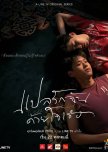
The beginning was promising and I liked the first two episodes but that changed when the story progressed and things between Teh and Oh Aew got (even more) complicated.
I tried hard to understand the characters, their motives, feelings and actions. I can imagine how confusing it must be for Teh to being sure he's straight but getting confronted with growing feelings towards his friend Oh Aew, but for me that does not justify his actions especially when he saw how much he hurt Oh Aew with them.
As for Oh Aew I wondered why he stayed close to Teh when he got repeatedly hurt because Teh was unable to be true to himself and others and actually speak out about that. When you care for someone no matter if it's out of love or friendship or any other reason wouldn't it be only natural to talk to them honestly when you see they get hurt by your silence or actions?
Sorry, but I could absolutely not relate to that and many other things Teh did. A lot of his actions seemed selfish to me and at some point I just lost all sympathy for him. To be honest, I didn't want him to end up happily ever after with Oh Aew. Oh Aew surely deserved better.
I'm not saying the entire story was bad, actually the general plot is really good. I just think they overdid it a bit with the drama and heartache. To me that didn't look realistic anymore but rather self-produced by the characters due to lack of honest conversations paired with dumb decisions.
Another issue I have is actually the acting of Billkin as Teh and his facial expressions, especially the crying. The scenes when he cried made me cringe really badly. Those scenes should be emotional, captivate the viewer and make them feel sympathy for the character yet I just wanted to fast forward or skip those scenes completely as they looked too extreme and I could not relate nor connect to it because in my opinion someone other than Teh had way more reason to cry their eyes out.
I think PP did better acting-wise, at least his portrayal of his character looked more authentic to me and actually made me feel sympathy for him. Well, except for one scene that gave me strange vibes because Oh Aew is questioning himself as a male and what he does is really exaggerating. Why did he even have that in his wardrobe? A bit too far fetched and just added to other scenes that failed in trying to show emotions because they went overboard by trying too hard.
Together Billkin and PP/Teh and Oh Aew lacked chemistry in my opinion. For me Oh Aew was a better match with Bas and that's not just based on the fact that Bas is a true friend to Oh Aew.
The music did not stick to my memory, sorry. It wasn't annoying because that would be something I would certainly not forget but that also means it wasn't outstanding nor memorable.
Rewatch value is non-existent for me. Teh as a character was too annoying for me and that's exactly why I decided not to watch IPYTM (season 2 of ITSAY). I read enough about it to know that I would only end up disliking Teh even more. In my opinion Teh's behavior in ITSAY was toxic enough for the relationship between him and Oh Aew.
Overall ITSAY did address some serious topics and I think it's good and important to do that because real life isn't a fluffy rom-com, but the way they did it might not work for everyone or even put some people off.
Was this review helpful to you?
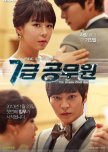
During the first 5 episodes, I really thought this drama was going to be great. The story was interesting, and the cast seemed fitting. It was funny, and sweet with some suspens...until the whole thing drowned into melotramatic clichés.
At some point, the actors stopped talking to each other, and instead began to just speak their lines with an affected manner, giving the audience the impression that they are philosophizing all episodes long, talking about "where they are in their relationship", and trying to convince us that they are about to kill each other, when actually there is not enought tension between them to generate so much as a slap.
I think the story also needed a strong opponent. Instead we got the evilness "because we are so evil and beautiful and cool and with a dark past it makes us even more evil".
It wasn't so bad that I would go as far as saying it would be a waste of time to watch it (come on, there IS Joo Won), but to me this really wasn't a good spy drama.
No, to all those who like spy dramas, I'd recommend the awesome Time Between Dog and Wolf, but not 7th Grade Civil Servant.
Was this review helpful to you?
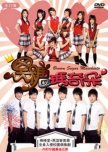
Story: I watched it because when I read the description, it "sounded" interesting. But having watched this when I was new to dramas, I was in for a surprise and not necessarily a pleasant one.
Acting/Cast: It was horrible. There was a lot of overacting by everyone.
Music: The music was fairly decent. I still listen to one song from the OST, "Bitter Tea".
Re-watch: I never plan on watching this again and I honestly don't recommend it to anyone.
Overall: I watched this when dramas were bright and shiny for me and when I didn't drop dramas. If had I watched this now, it would have been dropped by episode 2 at the most. Or more likely, I wouldn't have even bothered with it.
Was this review helpful to you?
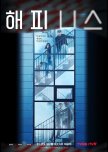
Bad writing and unsympathetic leads
No idea why this show has such good ratings. I'm at episode 9 and it just keeps getting worse. Except for the little girl, there isn't a single likable character. The lead couple is a pair of annoyingly condescending pricks and every other character is either a piece of sh** or a complete moron. Also, the idea that a disease could be transmitted by a drug is ludicrous. Drugs cause side effects, sometimes lethal ones, yes, but there's no way a drug can cause you to mutate into some rabid animal. That level of writing should tell you everything you need to know about this show. It's just bad. I'm curious to see how they'll wrap this up but am not getting my hopes up for an ending that makes sense.Was this review helpful to you?

This review may contain spoilers
You can look forward to this drama!
At first, i thought it was only just a typical highschool love story, well, i've watched a lot of cdramas already about youth, highschool, romance and comedy, that's why when i watched the starting episodes, i though it will gonna be the same as the other cdramas, but as i continued watching it, i really love how it depicts reality and life, i somehow can relate to mostof it (of course except for having ahandsome crush hehe) , their acting was natural also.I'm a fan of gu ran and guan fang duo friendship as well as gu ran and jiang jia,i love the comedy and humor the most between these characters, lurang was cute too when he's with zai, and the pressure lurang was feeling because of his brother is somehwat sad and it makes me reflects about how we really should be serious about studying, i really like it when lurang is smiling because of zai, it makes me smile too.
Guan fang is really a unique character as well, even though he doesn't get that much screen time comparing to his other four friends, he'll really eventually will caught your attention as well as his grandma, the way he takes care of his grandma and his granma taking care of him as well was heart melting, it was so sweet and i envy him for having a caring and loving grandma..
About Jiang jia deciding her major was depicted well in the drama as well, it just show that most of us indeed has the same situation deciding before entering college, maybe because it is one of the crucial and only time we can decide about what should we do next, and who'll be as an adult.
But i was really expecting for gu ran to take up his courage and confess about his feelings already but it's taking time, maybe becuase jiang jia isn't yet ready to be in a special relationship yet after quanyi. I really love their hate and love relationship theyre both so cute..
Overall, i love all the characters, you need to watch this if you feel like lost and sad, maybe this will make you forget about the reality we're living , i hope the drama will end nicely! You can look forward to this drama like how i am feeling right now!
Was this review helpful to you?
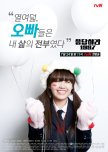
Not only because it's cute or 'cause the actors act quite well...it reminds our generation of our 1st!!! idol!
Foreigners wouldn't be able to imagine how great their popularity was at that time.
There was really nobody who didn't know who "HOT" and "Jackskiss" were.
Watching the drama, it feels like going back to the old good times and especially the music and the songs in the drama sounds familiar.
In Korea this drama is now quite an issue and people are saying that if this drama was broaded on MBC/SBS/KBS and not tvN it would definitly have had more public interest than it already has.
I really recommend you to watch this drama, although I haven't watched the whole drama yet^^
Was this review helpful to you?

The cast is mostly good. I started this because of Shin Sung Rok. My mistake. Even he couldn't save this drama.
Music would get on my nerves at times.
I will never watch this again.
I do not recommend this drama even to seaguk lovers.
Was this review helpful to you?

“Less Than Impressive Season 2”
Because I was utterly impressed with the screenplay of Lee Woo Jung, directing of Shin Won Ho, as well as the strong chemistry and camaraderie of the main cast in Season 1, I had high expectations for them to maintain the momentum, if not surpass it. But I was let down. Most of the scenes and lines that comprise Season 2 were repetitions and redundancies from the previous season such as the cute exchange of winks between father (Ik Jun) and son (Woo Ju), Ik Jun and Jun Wan wrestling like kids over some snacks, and Ik Jun hilariously reciting a subway recorded message to the annoyance of Seok Hyung, just to name a few. It’s like hearing the same old jokes which were funny the first time but had lost its comedic aspect when heard again for the second time. Another disappointment was the minimal exposure given to the endearing Woo Ju who captured many hearts in the first season. Why did the director and writer make us fall for the charming antics of this adorable wonder boy and then limit his scenes afterwards? And then there’s the dismal finale or episode 12. No impact, least efforts, anticlimactic. It was as if the writer had ran out of creative ideas, the director was no longer driven and the rest of the crew, fatigued. I don’t think the loose ends were purposely made to justify a Season 3. There was evidently no concerted effort in ending the popular series with a BANG.Was this review helpful to you?
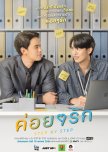
A WASTE OF TIME
I was excited back then when they have released the trailer of this drama, plus the super handsome boss Man Trisanu so I decided to wait and watch it. As I watch it and I came to episode 8 but still nothing is happening, there are so many scenes that is unnecessary that wasted the time of this drama, I was looking for something about the leads love story but even I came to episode 8 to 9 , I can't find it and even I don't know what exactly it is , it's just missing something.On the first 3 episodes, it was good and promising , like what's gonna happen to Pat and Mr. Jeng after they accidentally met and that Pat has spilled the milk tea on Mr. Jeng's shoe, but along the way it gets too much boring !
On episodes 9 and 10 the couples love story's trial to overcome was there and at the end they have over come it and able to get back to each other, but seeing the preview of the episode 11, having another trial to overcome where I thought it was all finished ! My heart became heavy watching this drama, I felt too bad for Man Trisanu He is too good looking and did great in acting but the other lead which is Pat is no match for him, for me, I get too irritated on Pat's facial expressions, he is so worried for so many things , he is always making that face that I don't like that much , I am sorry to say this but he made me uncomfortable watching that face.
The gossiping office mates scene or trial is too long, and the man that seems to be one of the shareholders of the company who oppresses Mr. Jeng is too trying hard to be the rival and Jengs father is I don"t understand if he is a bad guy or a friend ! I don"t understand the whole drama at all , the Story is hard to understand and is not on point
The only scene that I like is when Pat and Jeng got to enjoy each other < i believe that is on episode 10 , also I love Chot ! He is my favorite character here, I want hIm to be my friend !
I decided to drop this I cant bear to watch episode 11 and 12 anymore, I don't understand why they always choose to go away from each other.
I don't like the character they made to Jeng , he seems too professional and intelligent in the beginning but they made him too foolish at the end ! and Pat from beginning until the end he is a worrywart, he cannot give the acting that requires his character
i cannot recommend this drama to anyone , this is such a waste of time, I realized I do not like the whole drama at all , If many people watches this still, that probably because of Man Trisanu , he is too fine and he is the one to Saves this Drama.
sorry for a bad rating and review ..
Was this review helpful to you?

This review may contain spoilers
You will either love or hate this drama
As the title goes, you will either love or hate this drama. I guess the fact that I listed love before hate is a clue that I liked the drama. Admitedly it isn't the best drama but at the same time I don't consider it a bad one. For me this also isn't the best Bai Lu or Dylan Wang starrer, but one of the things I really liked about the drama is their very strong chemistry.Bai Lu is Bai Lu what more can I say. She was perfectly cast to play Zheng Shuyi. Honestly I've never seen her look bad in any style of dress she wears in her dramas and she does look good in red and also black for that matter. I appreciate the way she can shift from being jolly one moment then sad the next. When she cries I feel sad too. Without being sexist IMHO Zheng Shuyi has the bigger share of the blame between the two. If I put it into numbers, I would say 55 vs 45. She was already told for the professor that the way she apologized to Shi Yan wasn't appropriate because she kept on using her work as the excuse instead of apologizing as proper boyfriend and girlfriend. She simply has too much pride that it is getting in the way of her love. The only thing that I didn't like about her character was she kept on accomodating the advances of the younger suitor. If she loves Shi Yan as she keeps on saying then simply tell the other guy sorry and be done with it.
Dylan's being cast as Shi Yan was also good because he looks the part of an aloof CEO. Between the two leads Dylan's character has less emotional range because he hasn't really let go of his emotions. Shuyi has cried a lot but Shi Yan tries to drown everything with alcohol. I said above that both are at fault for their break up, and the only reason why he had the smaller blame was due to the fact that Shuyi approached her with ulterior motive. But what he did after wasn't really good. He also has too much pride and regardless if Shuyi kept on mentioning the colloboration between their companies, instead of banging his phone on the table, he should have just kept his emotions in check. The straw that broke Shuyi's back was his double edged statement with the reporter's of talking things out instead of walking away. It was already too late when he tried to message Shuyi only to find out they are no longer friends in WeChat. Well he did do it first to Shuyi.
I guess the Chinese writers are taking notes from South Korean writers now. They are getting good in annoying the viewers by dragging out the suffering of the two lovebirds. I guess a polite way of saying this is too much filler episodes. Can't be helped though with a total of five pair of lovebirds in the story. Regarding the other lovebirds I prefer the niece and the professor over the reporter and the muscle car driving rich guy.
I know this is a happy ending because there is a wedding in the opening credits, so I will soldier on with the last 6 episodes. I just hope there is less scenes involving the annoying suitor and please please please don't reconcile on episode 36. Give the viewers a few episodes of happiness by reconciling in episode 34 or 35 at the latest. Depending on what happens in the last 6 episodes my rating of this drama will either go up or down.
Was this review helpful to you?

This review may contain spoilers
The Fatal Flaw: a weak characterization of the female lead
With eagerness and anticipation, I approached this drama, drawn in by the allure of an antagonistic lead character. The male lead's acting prowess and striking features were truly remarkable. However, my excitement was soon dampened by the female lead's portrayal, which proved disappointing despite her beauty and acceptable performance.
Throughout the drama, the female lead consistently exhibited weakness and made ill-advised decisions, undermining the believability of the storyline. One such decision that still gnaws at me to this day was when she recklessly discarded the bracelet that was shielding her from harm, even though her own people were out to kill her. Another was her choice to consider marrying the second male lead, an action that ultimately did not come to fruition. While I comprehend her thought process, I cannot help but feel that she would have made a wiser decision had she taken the time to devise a plan. This frustration was compounded by her tendency to act impulsively without first thinking things through.
Additionally, the male lead could have benefited from taking more time to consider alternative solutions instead of playing the role of a white knight. A particularly irksome scene occurs when he fails to explain to the female lead why they cannot be together before her first death, leaving her confused and heartbroken.
While not all characters need to be strong and capable, pairing a meek and timid female lead with a powerful antagonist risks presenting a stereotypical representation. Though similar portrayals have been tolerable in other dramas such as "Ashes of Love," this particular one pushed the limits for me. While the female lead undergoes some character growth in later episodes, her decision-making still lacks logical reasoning. The pair could have also worked on their communication skills to prevent a significant portion of the problems they faced.
Another element that dampened my enjoyment of the drama was the male lead's loss of charm as the series progressed. While still a compelling antagonist, he loses some of the qualities that made him an intriguing character. In contrast, characters such as Yan Wushi in "Thousand Autumns" remain true to their "evilness" until the end, making them a favorite of mine.
Finally, the repeated deaths of the main characters was a source of frustration. As in the series "Supernatural," there comes a point when one simply wishes for them to remain deceased.
Despite these shortcomings, the drama does have some redeeming qualities. The male lead's commanding presence and impressive acting abilities compensated for some of the drama's deficiencies. The series also features several memorable scenes, such as the male lead's displays of power and his unwavering devotion to the female lead. The rescue scene in episode 11 stands out, with its impeccable cinematography, tension, and visuals.
Another unforgettable moment was when the male lead, shattered by one of the female lead's death, withdrew into a dream-like state, conveying his love, desperation, and longing in a tragically beautiful way. If the drama had concluded at that point, it would have become one of my all-time favorites, despite my aversion to tragic endings. In that moment, I did not miss the female lead at all, making it a tragically beautiful happy ending for me.
Although I did not love the pairing in the drama, I found their interactions in behind-the-scenes videos to be charming and endearing, deepening my appreciation for their friendship.
In summary, while the drama is not without flaws, it is still worth watching for those who can overlook the frustrating portrayal of the female lead. The male lead's commendable performance and the drama's memorable scenes make it a compelling watch. However, the female lead's weak character and questionable decision-making may detract from overall enjoyment.
"Great acting can make a poorly written character somewhat tolerable, but no amount of great acting can make a poorly written character great." - Dan Harmon
This quote is sadly true in this case.
Was this review helpful to you?
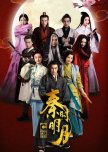
This is a typical wuxia story, at least for recent wuxias, with the main lead finding out he has powers and becomes the most wanted. I personally don't mind because I actually dig this kind of plot, but you might get tired if you've seen several wuxias of this kind of plot in a row. (Similar dramas include: Legend of Chusen, Legend of Zu, and many more...) The story drags a bit near the second half of the drama and before the ending, but it's bearable.
Here's the unbearable part: the main lead's stupidity level is off the charts annoying. He's quite stubborn and his actions are just childish because he doesn't think things through and only cares about his own feelings (which is understandable but overdone). He doesn't have enough character development (or at least it happens too slow) which is why you may end up hating the main lead and going for the second leads instead, or you'll just drop this drama. Honestly, if not for the minimal/slow character development and the annoying main character, I would rate this drama even higher. But without the second leads, this drama would be a waste of time.
Now that I've warned you enough about the main character, go watch this drama for the sweet moments for both the main and second leads!! The sweet moments balance out the main character's annoyingness for sure.
Was this review helpful to you?
Recent Discussions
-
 BL Drama Lovers Club14 seconds ago
BL Drama Lovers Club14 seconds ago -
** Moon BAR + Starlight KTV + Moon SPA **3 minutes ago
-
 My Theory (Spoilers)3 minutes ago
My Theory (Spoilers)3 minutes ago -
 Is LUZHOU AIR a real thing?8 minutes ago
Is LUZHOU AIR a real thing?8 minutes ago -
 Xiang Liu and Xiao Yao’s Story and Romance18 minutes ago
Xiang Liu and Xiao Yao’s Story and Romance18 minutes ago


